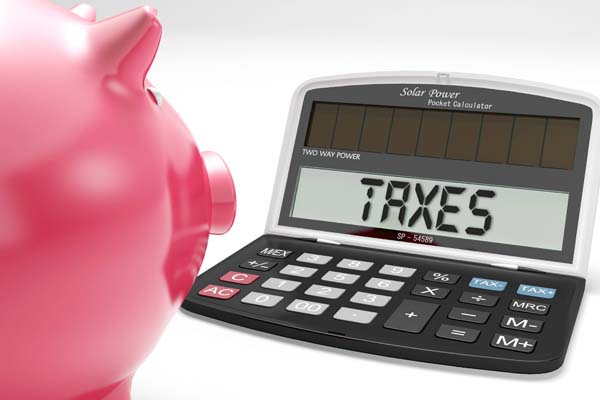Boston North Shore tax advantages are one of the many perks to home ownership. Tax deductions are important to those homeowners who itemize when they file their personal income tax returns. With the tax deadline quickly approaching, it’s important to know how to calculate your homeowner tax benefits. Here’s a brief analysis of how your tax advantages work.
Boston North Shore Tax Benefits: How to Calculate

The cost of your primary residence.
If you own a home and have a mortgage, your monthly housing expense is made up of four integral parts: principal, interest, taxes and insurance. The four components are commonly referred to as PITI.
Your monthly mortgage payment to your lending institution includes principal (the amount of money your borrowed) and interest (the contracted percentage rate calculated each month on the outstanding principal balance.) As you make payments, principal reduces the balance of your loan each month, while interest is the cost of borrowing the money paid to your lender each month.
Taxes are real estate property taxes assessed by your county and/or city each quarter, semiannually or annually. Your tax bill is dependent on the assessed value of your home and will vary from state to state
Insurance is comprised of premiums paid to a homeowner’s insurance company to protect you and your mortgage lender in the event your home is damaged by a fire, flood, earthquake or other disaster.
Let’s take a look at an example of what the PITI payment may be on a typical home.
Say you purchased a home for $300,000 with a 20% down payment. Let’s assume you obtained a 30-year fixed rate mortgage at 3.5%. Using a popular mortgage calculator, here’s your approximate PITI breakdown:
Principal and interest (the mortgage payment) $1,077 per month
Property taxes (using a U.S. average rate of 1.2% on the $300,000 value) $ 300 per month
Homeowner’s insurance $ 75 per month
TOTAL COST $1,452 per month
Annual Boston North Shore tax advantages for a homeowner’s primary residence.
When you own a home and use it as your primary residence, you are allowed to deduct the annual interest on your mortgage loan and the real estate property tax you pay each year.
Using the above illustration as an example, of the total principal and interest payment of $1,077, around $700 is the interest portion and $377 goes toward paying down the principal. Therefore, the amount of interest you will pay during the year will be roughly $8,400 ($700 per month x 12 months.)
Again, using the example above, the property taxes are $3,600 annually ($300 per month x 12 months.)
Added together, these two amounts — your mortgage interest and your real estate property taxes – total $12,000. That full amount may generally be deducted from your income taxes, (for low-to-moderate-income homeowners.)
How do tax deductions help save money?
In preparing to file your income tax returns each year, you may have heard of a form called Schedule A: Itemized Deductions. That’s where you list allowable deductions that are deducted from your income. The result is you pay taxes on a lower income amount.
Schedule A contains line items for mortgage interest and real estate property tax deductions. Using the above example, the IRS allows you to itemize the $8,400 in mortgage interest paid during the taxable year, as well as the $3,600 in real estate property taxes paid during the taxable year.
By itemizing those two allowable deductions, you can reduce the amount of income on which you will pay taxes by $12,000.
To complete the example, let’s say you earned a total of $90,000 during the taxable year. The two line item deductions above totalling $12,000 are subtracted or “deducted” from your $90,000 gross income for an adjusted gross income on which you’ll be taxed of $78,000.
While different income levels are taxed at different percentage rates, you’d be taxed at roughly a 28% tax rate on this income amount. Estimate the amount of savings the tax deductions save you by multiplying the $12,000 in deductions by the 28% tax rate. That produces an estimated annual Boston North Shore tax savings of $3,360. That’s the amount of savings you will enjoy by owning a primary residence with a mortgage.
Taking it a step further, if you convert the annual savings of $3,360 to a monthly amount of $280 and subtract it from the total PITI above of $1,452, the net “after-tax benefits” monthly cost is reduced to $1,172.
Additional Boston North Shore tax benefits.
There are additional tax advantages for owners of primary residences that should be considered. Points paid to a mortgage lender for the origination or refinance of a mortgage loan are deductible. In addition, home energy credits, deducting mortgage insurance for lower earners and deductions for a home office are all examples of allowable tax deductions. However, each can be a little tricky, so make sure you read the fine print and understand what’s allowed. We suggest you get answers from your CPA or tax advisor.
There are other homeowner tax benefits you may enjoy when you sell your primary residence. Single taxpayers are exempt from having to pay capital gains taxes on up to $250,000 in capital gains realized from the profit of selling their home. The exemption increases to $500,000 for married taxpayers. Plus, any money you spent on home improvements or renovations while you owned the property will reduce your capital gain.
The above information applies to primary residence owners. Some of the rules may also apply to second-home owners. Consult your Boston North Shore tax advisor for variations on second-home deductions. And, if you own rental property, it’s a good idea to also discuss your tax benefits with a CPA or tax professional,
Get more Boston North Shore tax tips at our Taxes section of articles just below Boston North Shore Real Estate Categories to your right. Follow our posts also on Facebook and Twitter.
